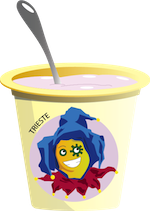Team:Trieste/data
From 2012.igem.org
(Difference between revisions)
Samarisara (Talk | contribs) |
Drikicmarija (Talk | contribs) |
||
| Line 82: | Line 82: | ||
<h3>BBa_K875005, LPP-OmpA-SIP:</h3> | <h3>BBa_K875005, LPP-OmpA-SIP:</h3> | ||
<br/> | <br/> | ||
| - | We | + | We designed this biobrick containing SIP as a valid alternative to scFv because SIP confers bivalent binding properties to the antibody. |
<br/> | <br/> | ||
<br/> | <br/> | ||
<h3>BBa_K875006, PelB-scFv:</h3> | <h3>BBa_K875006, PelB-scFv:</h3> | ||
<br/> | <br/> | ||
| - | We | + | We created this composit biobrick to use as an system which allows the secretion of proteins, in this case the antibody, first into periplasm and then extracellularly. |
<br/> | <br/> | ||
<br/> | <br/> | ||
<h3>BBa_K875007, PelB-SIP:</h3> | <h3>BBa_K875007, PelB-SIP:</h3> | ||
<br/> | <br/> | ||
| - | We | + | We built this biobrick (secreted version of SIP) because soluble form of SIP plays an important role it enteric infections. |
<br/> | <br/> | ||
<br/> | <br/> | ||
<h3>BBa_K875008, Tse2 toxin:</h3> | <h3>BBa_K875008, Tse2 toxin:</h3> | ||
<br/> | <br/> | ||
| - | We | + | We demonstrated that this composit is a important mechanism through which we can eliminate bacteria from their intracellular space.<br/> |
<br/> | <br/> | ||
<h3>BBa_K875009, LL37-T4 holin:</h3> | <h3>BBa_K875009, LL37-T4 holin:</h3> | ||
<br/> | <br/> | ||
| - | We | + | We projected this composit using LL-37 which is a very powerful human antimicrobial peptide. LL-37 kills bacteria destroying the outer membrane, this toxin acts in combination with the T4 holin which breaks the inner membrane allowing the contact between LL-37 and the outer membrane. |
Revision as of 21:42, 26 September 2012
Data
More
An overview on our system

This is a diagram summarising our system. It consists of two parts: the production of Ab against NoroVirus and the gene guard.
Concerning the gene guard, CymR inhibits the T5 Cumate Operator Promoter avoiding the production of the T4 Holin (permeabilizes the cytoplasmatic membrane) and the LL 37 cathelicidin (human antimicrobial peptide able to disrupt the outer membrane).
When the cumate is given, it binds and inactivates the CymR, derepressing the T5 Cumate Operator Promoter and allowing the expression of T4 Holin, that permeabilizes the cytoplasmatic membrane, allowing the secretion of LL 37 that disrupt the outer membrane.
Moreover, the horizontal transfer from our Nissle into another bacteria is avoided thanks to our gene guard. The receiving bacteria do not produce the CymR repressor, so the T5 Cumate Operator Promoter is activated allowing T4 Holin and LL 37 expression. Bacteria die!
Our favourite parts:
 |
BBa_K875001, T5 cumate operator:We have demonstrated that it is a very strong and strictly regulated promoter. Thanks to its rapid reactivity it's one of the first candidate for the expression and production of toxin in case of necessity. |
 |
BBa_K875003, CymR:We have succesfully expressed the CymR. We have also showed his stringency as repressor of the T5 Cumate Operator that makes the all system a very useful mechanism for an high specificity expression. |
 |
BBa_K875004, LPP-OmpA-scFv:We have verified the production of this protein at high yield. LPP-OmpA system is a very powerful method for displaying proteins on the external membrane, in this case the antibody scFv 54.6. |
The part we have improved:
 |
BBa_K875020, Beta-Glucosidase (Osaka 2010):This composite part is developed by previous work by UNITS iGEM team 2011 and Edinburgh team 2011. We improved and characterized this part demonstrating its efficiency. |
Other parts that we have developed:
BBa_K875002, T5 Lac Operator:
We have shown that this promoter is a very useful biobricks in the primary testing of protein expression thanks to his handiness.
BBa_K875005, LPP-OmpA-SIP:
We designed this biobrick containing SIP as a valid alternative to scFv because SIP confers bivalent binding properties to the antibody.
BBa_K875006, PelB-scFv:
We created this composit biobrick to use as an system which allows the secretion of proteins, in this case the antibody, first into periplasm and then extracellularly.
BBa_K875007, PelB-SIP:
We built this biobrick (secreted version of SIP) because soluble form of SIP plays an important role it enteric infections.
BBa_K875008, Tse2 toxin:
We demonstrated that this composit is a important mechanism through which we can eliminate bacteria from their intracellular space.
BBa_K875009, LL37-T4 holin:
We projected this composit using LL-37 which is a very powerful human antimicrobial peptide. LL-37 kills bacteria destroying the outer membrane, this toxin acts in combination with the T4 holin which breaks the inner membrane allowing the contact between LL-37 and the outer membrane.







 "
"









